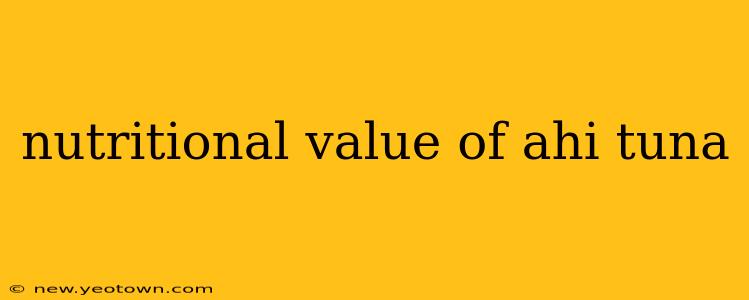Ahi tuna, also known as yellowfin tuna, isn't just a culinary delight; it's a nutritional powerhouse packed with essential nutrients that benefit your overall health. Imagine a vibrant plate, glistening with the rich red of perfectly seared ahi, and know that you're about to enjoy a meal brimming with goodness. Let's dive into the details of what makes ahi tuna such a valuable addition to a healthy diet.
What are the key nutrients in Ahi Tuna?
Ahi tuna is exceptionally rich in protein, boasting a generous amount per serving. This protein is crucial for building and repairing tissues, making it an excellent choice for athletes and anyone seeking to maintain muscle mass. But the benefits don't stop there. Ahi tuna is also a treasure trove of essential vitamins and minerals. It's an excellent source of vitamin B12, vital for nerve function and red blood cell production, and a good source of niacin (vitamin B3), crucial for energy metabolism. Furthermore, it offers significant amounts of selenium, a powerful antioxidant that protects your cells from damage, and potassium, which helps regulate blood pressure.
Is Ahi Tuna high in mercury?
This is a frequently asked question, and understanding the answer is crucial. Yes, ahi tuna does contain mercury, like many other types of fish. However, the amount varies depending on the size and age of the fish. Larger, older tuna tend to accumulate more mercury. Therefore, it's recommended to consume ahi tuna in moderation as part of a balanced diet, following guidelines provided by health authorities. Choosing sustainably sourced ahi tuna can also help minimize mercury exposure.
How many calories are in Ahi Tuna?
The calorie content of ahi tuna can vary slightly depending on the preparation method, but generally, a 3-ounce serving provides a moderate amount of calories, making it a suitable addition to a weight-management diet. However, it's important to be mindful of added fats and oils when preparing ahi tuna to keep the calorie count in check. Grilling, baking, or pan-searing with minimal oil are healthier options compared to deep frying.
What are the health benefits of eating Ahi Tuna?
The health benefits of incorporating ahi tuna into your diet are numerous. Beyond the individual nutrients already discussed, the combined effect contributes to several significant health advantages. The high protein content supports muscle growth and repair, while the essential fatty acids contribute to heart health. The selenium content acts as a potent antioxidant, protecting against cellular damage and potentially reducing the risk of chronic diseases. Furthermore, the vitamin B12 content is crucial for maintaining healthy nerve function and preventing anemia.
Is Ahi Tuna good for weight loss?
Ahi tuna can be a valuable component of a weight-loss diet. Its high protein content promotes satiety, helping you feel fuller for longer and reducing overall calorie intake. The moderate calorie count also contributes to its suitability for weight management. However, remember that weight loss is a holistic process involving a balanced diet and regular exercise.
How can I prepare Ahi Tuna?
The versatility of ahi tuna allows for a wide range of cooking methods. From searing to grilling, baking to ceviche, the possibilities are endless. Experiment with different spices and marinades to discover your preferred taste and preparation method. Remember to always cook ahi tuna to a safe internal temperature to eliminate any potential health risks.
By understanding the nutritional profile and benefits of ahi tuna, you can confidently incorporate this delicious and nutritious fish into your diet. Remember moderation is key, and always consider the source and sustainability of the tuna you choose. Enjoy the delectable taste while reaping the numerous health rewards!

